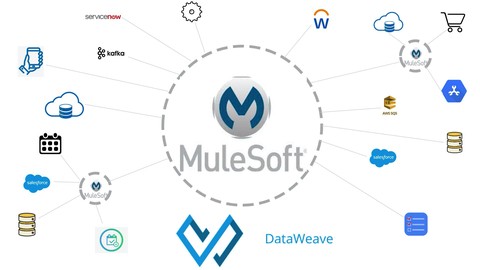
MuleSoft DataWeave 2.0 deep dive
-
Advanced data transformation with Mulesoft Dataweave 2.0 -
Skills for a successful enterprise data transformation and data integration career using Anypoint Platform. -
Read and parse XML/JSON content as a string, from a classpath resource file or http endpoint. -
Write reusable Java static and instance methods for advanced Dataweave transformations. -
Advanced exception handling including nested retry on exception and standardized error model to consumer. -
Advanced concepts with XML/JSON/CSV transformations.
- Basic understanding of any programming language.
- Basic knowledge of Mule Anypoint Platform.
Course Overview
In this course, you will learn DataWeave 2.0, MuleSoft’s expression language for advanced data transformation and data integration. The course has been designed with all target level learners in mind, so we will start with the basic constructs and write our first DataWeave program. We will then learn how to work with selectors to traverse through complex arrays and objects. With a practical application of DataWeave module functions like map, mapObject, filter, filterObject and reduce, we will now be ready to get in more advanced topics like writing our own mappings and modules, calling Java methods from DataWeave, handling exceptions and retrying on failures etc. We will also work between XML/JSON/CSV transformations so you will get a sense of various formats and functions available in DataWeave to handle these different formats.
Requirements
Basic knowledge of any programming language and some exposure to AnyPoint Platform are a plus. But Just a ready to learn attitude will also be enough to get the most out of this course.
Course Highlights
1. Learn advanced DataWeave 2.0 skills for a successful enterprise data transformation and data integration career using AnyPoint Platform.
2. Apply useful Core, String, Array, Object, and Runtime module functions.
3. Map, MapObject for working effectively with complex array and object structures.
4. Using recursion and tail recursion concepts for robust transformations.
5. Write reusable custom mappings and custom modules.
6. Import input metadata, create custom Java Output metadata model and perform input/output mapping via the UI.
7. Read and parse XML/JSON content as a string, from a classpath resource file or http endpoint.
8. Write reusable Java static and instance methods for advanced DataWeave transformations.
9. Advanced exception handling including nested retry on exception and standardized error model to consumer.
10. Advanced concepts with XML/JSON/CSV transformations.
- Course is designed for Basic to Professional level students who are looking to start/advance their career in Mule.
- Course also covers applicable content for MuleSoft Developer certifications.






